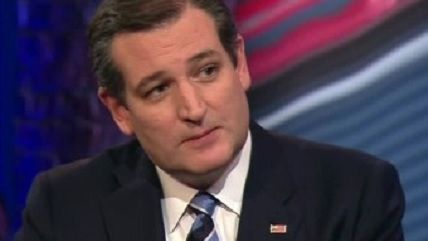Ted Cruz Says Apple Needs to Comply With the Court Order on Encrpytion, It's All Constitutional
Also calls himself a constitutionalist.


Ted Cruz said he believed Apple should comply with a court order forcing the private company to assist the FBI and develop software that would permit the agency to bypass the security measures on an iPhone that was used by one of the San Bernardino shooters. He appeared last night at a South Carolina town hall hosted by CNN and moderated by Anderson Cooper.
Cruz said Apple had a binding search order that it should follow. Apple's CEO, Tim Cook, has resisted the government, arguing in an open letter to customers yesterday that the order had "implications far beyond the legal case at hand" and that any software Apple created to bypass the encryption on the San Bernardino iPhone could be used on any iPhone of the same model.
Cruz disagreed, insisting while Apple had a "serious argument that they should not be forced to put a backdoor in every cellphone everyone has," law enforcement had the better argument. The FBI, Cruz insisted, got a search order, which was "consistent with the Fourth Amendment." Apple, Cruz claimed, was being told to "open this phone, not Anderson's phone, not everyone's here, open this phone."
Cruz didn't mention that the iPhone of the attacker belonged the county health department, because the attacker was a government health inspector. A discussion about whether local (and larger) governments should be handing out phones to their employees that they can't access when necessary seems a lot more appropriate in this instance than one about whether the government should get a way in to everyone's phones.
In his letter, Cook had already rejected arguments that "building a backdoor for just one iPhone is a simple, clean-cut solution." That, Cook explained, ignored "both the basics of digital security and the significance of what the government is demanding in this case." He compared the software Apple was being ordered to develop to a master key that was "capable of opening hundreds of millions of locks."
While Cruz insisted Apple should comply with the order forthwith, Apple also has the right to appeal, which it has said it would be doing. Cruz insisted last night that the government order, and the abrogation of the right to the security of our personal papers and effects from government access that came with it, was consistent with the Fourth Amendment. But the case could go all the way to the Supreme Court.
In other portions of the town hall, Cruz argued he was a "constitutionalist" who would appoint the best (conservative) justices. His answer on Apple doesn't bode well for the Fourth Amendment. It was much easier for Cruz to call the judicial order for Kim Davis, a Kentucky clerk, to perform the duties required of her, "lawless" because of the perceived abrogation of her rights in that instance.
Apple's argument, however, may not be as clear as it sounds either. Shane Harris at The Daily Beast reports that Apple has unlocked phones for authorities on at least 70 occasions in the last eight years. The feds, Harris reported, had also admitted to having developed a method to get through the encryption of one version of the iPhone iOS. That appears to undercut the government's use of the All Writs Act of 1789, which requires such an order as Apple received to be a last resort for method.
Harris also brought up a New York case involving a meth dealer's iPhone that Apple is also resisting. There, Apple is arguing, among other things, that the "reputational harm" caused by breaking into the phone for the government "could have a longer term economic impact beyond the mere cost of performing the single extraction at issue." Apple didn't start positioning itself as a guardian of privacy, Harris noted, until Edward Snowden's disclosures about the scale of the government's Internet surveillance activities.
Customers want their data to be secure, and will seek out service providers that can offer that. Ted Cruz acknowledged that an encryption backdoor is a legitimate concern because of hackers and cyber criminals that could try to break into people's phones. But people are also concerned about the government doing so, hence the reputational pressure felt by Apple.
Government does not face such reputational pressures, and given Ted Cruz's uncanny ability to occupy every side of a position at the moment that side is the politically opportune one and his rise in the polls, maybe neither does he.


Show Comments (259)